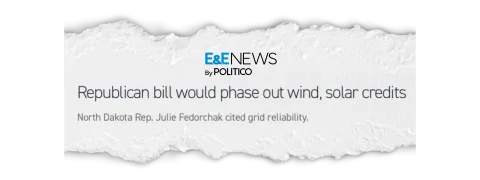ICYMI: E&E News: Fedorchak bill would phase out wind, solar credits
Congresswoman Julie Fedorchak (R-ND) introduced the Ending Intermittent Energy Subsidies Act last week, a bill that would responsibly phase out production and investment tax credits for wind and solar energy over the next five years. The legislation will help restore market signals that prioritize grid security, while maintaining incentives for clean, reliable technologies like nuclear, hydropower, and geothermal. Check out highlights and key excerpts from E&E News article below:

“The 'Ending Intermittent Energy Subsidies Act' would phase out two production and investment credits, known as 45Y and 48E for their places in the tax code, over the course of five years for wind and solar energy generation while maintaining the incentives for other climate-friendly technologies like nuclear and geothermal.
"The legislation is one of the first bills developed this year designed to roll back a key component of the Democrats' 2022 climate law, as Republican leaders consider repealing parts of the IRA through the budget reconciliation process.
"At a hearing earlier this year, Fedorchak told the House Ways and Means Committee, which has jurisdiction over tax policy, that IRA credits for wind and solar pose unprecedented reliability risks to the nation's electric grid due to their intermittent nature. She also cited grid reliability concerns caused by ‘market distortions’ in a summary of the legislation.
'Most Americans, especially lawmakers, don't realize the threat rapid expansion [of wind and solar] is having on the reliability and affordability of our electric grid.’ Fedorchak said at the hearing. ‘We're in danger of building a weather-dependent electricity grid.’”
[...]
“The Cato Institute, a free-market think tank, estimates that Sections 45Y and 48E could cost up to $901 billion over the next decade in their current form.”
[...]
"Fedorchak, a former member of the North Dakota Public Service Commission, has argued that tax credits are meant to aid emerging technologies that need incentives to compete in an open market.
"Wind and solar generation, she believes, do not qualify as emerging technologies, given their record growth in recent years and being responsible for a combined 17 percent of U.S. generation."
[...]
“The new bill continues Fedorchak's push on grid reliability. She also introduced a resolution, H.Res. 290, earlier this week recognizing the urgent and growing threats to the reliability of America's electric grid due to increased power demand and the retirement of baseload generation like coal-fired power plants.”
CLICK HERE to read the full article.